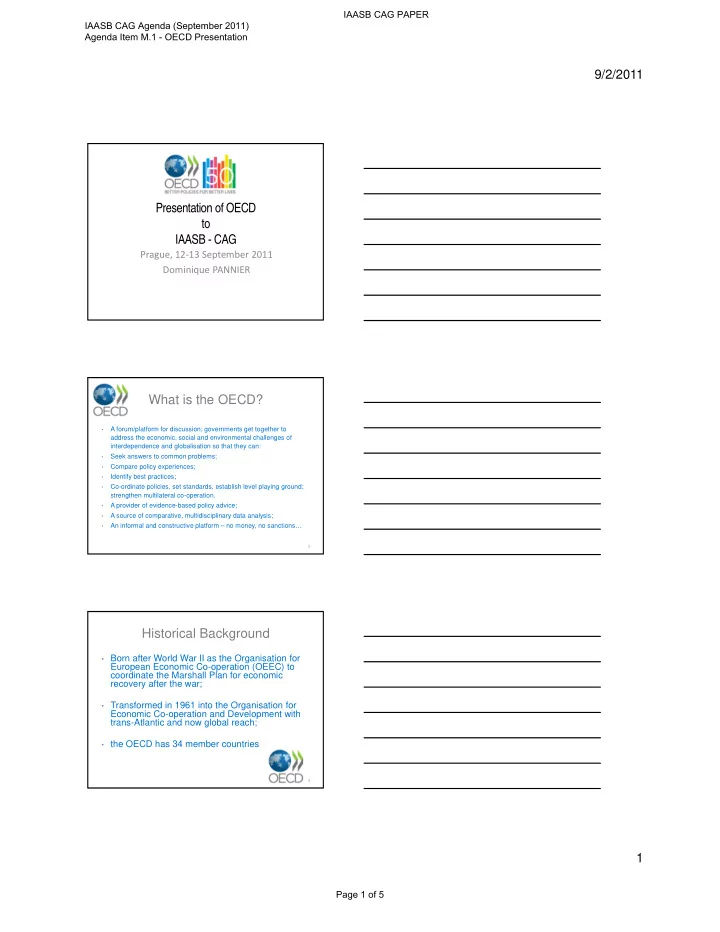

IAASB CAG PAPER IAASB CAG Agenda (September 2011) Agenda Item M.1 - OECD Presentation 9/2/2011 Presentation of OECD to IAASB - CAG Prague, 12 ‐ 13 September 2011 Dominique PANNIER What is the OECD? A forum/platform for discussion; governments get together to • address the economic, social and environmental challenges of interdependence and globalisation so that they can: Seek answers to common problems; • Compare policy experiences; • Identify best practices; • Co-ordinate policies, set standards, establish level playing ground; • strengthen multilateral co-operation. A provider of evidence-based policy advice; • A source of comparative, multidisciplinary data analysis; • An informal and constructive platform – no money, no sanctions… • 2 Historical Background • Born after World War II as the Organisation for European Economic Co-operation (OEEC) to coordinate the Marshall Plan for economic recovery after the war; • Transformed in 1961 into the Organisation for Economic Co-operation and Development with trans-Atlantic and now global reach; • the OECD has 34 member countries 3 1 Page 1 of 5
IAASB CAG PAPER IAASB CAG Agenda (September 2011) Agenda Item M.1 - OECD Presentation 9/2/2011 OECD member countries account for -70% of world • GNI (versus 80% twenty years ago); ~60% of world trade; 45% CO2 emissions, 46% world energy consumption. But account for only 18% of the world’s population. So, Enhanced engagement with some significant • economic players: China, Brazil, India, S. Africa and Indonesia; Engaged in working relationships with more than 70 • developing and transition economies, many taking part in as observers in OECD committee and other meetings. In all, work with most countries in the world. 4 OECD’s Mission Article 1 of the OECD Convention: Support economic growth; • Boost employment; • Raise living standards; • Maintain financial stability; • Assist other countries’ economic development; • 5 Fast facts • Headquarters: Paris • OECD Centres: Berlin, Mexico City, Tokyo, Washington • Secretary-General: Angel Gurría • Secretariat staff: 2 500 • Annual budget: 343 € million • Nearly 300 expert committees and working groups and over 40,000 officials participating in these bodies’ meetings per year 6 2 Page 2 of 5
IAASB CAG PAPER IAASB CAG Agenda (September 2011) Agenda Item M.1 - OECD Presentation 9/2/2011 Who does what? Council (Ambassadors of member countries ) Oversight and Strategic Direction: issues, budget Committees Secretariat Discussion, Decision- Research, Analysis, making by consensus Conclusions Output Policy Recommendations, Guidelines, Classification systems, Conventions Peer review • Examination, monitoring of country policies and practices by experts from other countries: - Peer pressure - Common methodology and criteria to assess performance for all countries - Systematic monitoring mechanism: reviews, meetings, publications - Best practices • Results: Peer learning and capacity building 8 Better lives from every angle : areas of expertise Fairer Development assistance Migration Education Healthcare Pensions Employment Corruption Competition Trade Governance Tax evasion Entrepreneurship Climate Fiscal policy change Innovation Finance Cleaner Stronger Energy Agriculture 9 3 Page 3 of 5
IAASB CAG PAPER IAASB CAG Agenda (September 2011) Agenda Item M.1 - OECD Presentation 9/2/2011 Special bodies within the OECD • International Energy Agency (IEA) • Nuclear Energy Agency (NEA) • Development Centre • Global Forum on Transparency and Exchange of Information for Tax Purposes • Development Cooperation Directorate and Development Assistance Committee (DCD/DAC) • Middle East and North Africa (MENA) projects (governance and investment), • Africa Partnership Forum (APF) • Sahel and West Africa Club • Financial Action Task Force (FATF) • Centre for Educational Research and Innovation • International Transport Forum 10 OECD Relations with Civil Society: visibility among stake-holders WHO? HOW? Policy dialogue, consultations, networking and outreach Think tanks, Parliamentarians: Council of Parliamentarians: Council of BIAC academia Europe, NATO, OECD Centres, Europe, NATO, OECD Centres, Official visits, OECD U.S. Official visits, OECD U.S. Congressional Leadership Group Congressional Leadership Group Parliamentarians , TUAC ngos Other stakeholders, business, Other stakeholders, business, trade, students, etc. : Seminar trade, students, etc. : Seminar Programme, Guided tours/visits Programme, Guided tours/visits Global Forums, OECD Forum Global Forums, OECD Forum 11 Some OECD Achievements Improving transparency and ethics in international business: • Principles of Corporate Governance; Polluter Pays Principle (PPP); Guidelines for Multinational Enterprises; Anti-Bribery Convention (legally binding) Simplifying tax issues in international transactions: OECD Model • Tax Convention; fighting tax evasion and bank secrecy; OECD list of tax havens (link to G20) Helping emerging and transition economies: Guidelines on the • reduction of poverty; …on conflict prevention; co-operation programmes with emerging market economies (China, India, Brazil); regional programmes MENA, SEE; • Environment: System of Classification on chemically dangerous products, system of identification of genetically modified organisms. 02/09/2011 12 4 Page 4 of 5
IAASB CAG PAPER IAASB CAG Agenda (September 2011) Agenda Item M.1 - OECD Presentation 9/2/2011 www.oecd.org 13 02/09/2011 14 5 Page 5 of 5
Recommend
More recommend